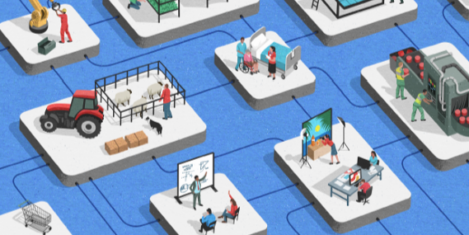March 6, 2014
Business continuity report confirms technology still biggest threat to firms
 Forget the recent UK floods. When it comes to risks to their businesses, it’s still tech that keeps business leaders awake at night, according to the latest annual Business Continuity Institute Horizon Scan report. Technology related threats continue to rank higher than natural disasters, security and industrial action according to the report which gauges the threats that organisations consider to be their biggest concerns. Nearly four-fifths of business leaders fear that an unplanned technological event, cyber attack or data breach will harm their business. Nearly three quarters (73 percent) consider malicious attacks through the Internet a major threat that needs to be managed closely, while nearly two-thirds (63 percent) think that social media remains a challenge. Meanwhile, one of last year’s threats – supply chain resilience – dropped out of the top ten completely.
Forget the recent UK floods. When it comes to risks to their businesses, it’s still tech that keeps business leaders awake at night, according to the latest annual Business Continuity Institute Horizon Scan report. Technology related threats continue to rank higher than natural disasters, security and industrial action according to the report which gauges the threats that organisations consider to be their biggest concerns. Nearly four-fifths of business leaders fear that an unplanned technological event, cyber attack or data breach will harm their business. Nearly three quarters (73 percent) consider malicious attacks through the Internet a major threat that needs to be managed closely, while nearly two-thirds (63 percent) think that social media remains a challenge. Meanwhile, one of last year’s threats – supply chain resilience – dropped out of the top ten completely.















 Hybrid working could bring nearly four million people “locked out” from work such as parents, carers and disabled people into the workforce and enable part-time workers to work more hours adding £48.3bn to the UK economy each year, according to a new study by
Hybrid working could bring nearly four million people “locked out” from work such as parents, carers and disabled people into the workforce and enable part-time workers to work more hours adding £48.3bn to the UK economy each year, according to a new study by 
 Spaceflow, a tenant experience operating system and Flowbox, an in-building advanced technology management company, announce their partnership. Through their common product offering, Flowbox and Spaceflow help landlords and building operators with their ESG (Environmental, Social and Governance) goals. With FLOW, real estate companies can monitor energy consumption, occupancy, air quality, temperature, CO2 levels, humidity and in later phases, control and automate their building hardware in one platform. Real-time data helps owners and managers optimize operations, streamline the use of energy sources, reduce operating costs and be guided through investment decisions.
Spaceflow, a tenant experience operating system and Flowbox, an in-building advanced technology management company, announce their partnership. Through their common product offering, Flowbox and Spaceflow help landlords and building operators with their ESG (Environmental, Social and Governance) goals. With FLOW, real estate companies can monitor energy consumption, occupancy, air quality, temperature, CO2 levels, humidity and in later phases, control and automate their building hardware in one platform. Real-time data helps owners and managers optimize operations, streamline the use of energy sources, reduce operating costs and be guided through investment decisions. 
























March 5, 2014
New data suggests that London no longer belongs to the UK, but the World
by Mark Eltringham • Comment, News, Property
Image: London Snap
One of the subjects touched on in the first episode of Evan Davis’s BBC documentary series about the economic distinctions between London and the rest of the UK Mind the Gap was the impact of investment by the global super-rich into London property. At one point he asked the Malaysian investor behind the £8 billion Battersea Power Station redevelopment whether he’d considered investing in other cities in the UK. The response was a straight no, but the accompanying glance said rather more. London is no longer a British city but one that belongs to the world, it said, so any comparison with Manchester, Birmingham, Bristol, Leeds, Cardiff and Edinburgh is meaningless. You might disagree with this point of view, but a raft of new data appears to make it very evident indeed that London is now shaped by global plutocrats in a way that cannot be mirrored in the rest of the UK.
More →